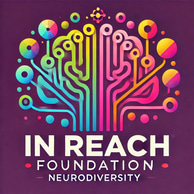Our Purpose
At In Reach Foundation, our mission is to create a world where individuals with disabilities, including neurodivergent individuals, and their families are empowered to thrive. We are committed to providing personalized, evidence-based support that ensures access to education, healthcare, and opportunities for growth. By championing diversity and advocating for systemic change, we aim to foster an inclusive society where all individuals are seen, heard, and respected for their unique abilities.
Our Commitment: Breaking Barriers
At the In Reach Foundation, we believe in the power of possibility. Our work is driven by a deep commitment to dismantling the barriers that prevent individuals with disabilities from achieving their fullest potential. From advocating for policy reforms to offering direct support programs, we are dedicated to building inclusive communities where individuals with disabilities and their families can flourish.
Empowering Independent Lives
We envision a future where all individuals with disabilities children and adults alike have the opportunity to lead independent lives, engage in meaningful work, and contribute to society in ways that are valued and respected. Our goal is to remove the barriers to success, empowering every individual to live life on their own terms.
Our Call to Action: Leading by Example
We are committed to driving systemic reforms that challenge outdated attitudes and eliminate discriminatory practices. Through strategic partnerships, research, and public awareness campaigns, we aim to:
Ensure all communications, policies, and services are accessible to individuals with disabilities.
Provide comprehensive cultural and diversity training to professionals in education, healthcare, and social services.
Challenge and transform societal perceptions of disabilities and neurodivergence.
Creating an Inclusive Future Together
We call on organizations, governments, and communities to prioritize inclusivity and equality, including:
Ensuring government documents, consultations, and communication are accessible.
Providing comprehensive training for frontline workers to address and overcome biases.
Developing strategies and policies that meet the unique needs of individuals with disabilities at every level.
Support
Our friendly team is here to help Wednesday to Friday, 9am to 5pm
Ready to start your journey with SENsational Holidays?
info@inreachfoundation.com
+07947638998
© 2024. All rights reserved.
